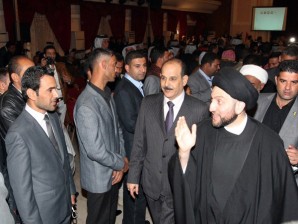
Iraqi Shiite Muslim leader Ammar al-Hakim of the Supreme Iraqi Islamic Council (R) and Iraq’s former interior minister Jawad al-Bolani (2R) arrive at a press conference in Baghdad on December 1, 2012, to announce the establishment of a new political movement headed by Bolani, called Badaana, that will contest in the Iraqi elections next year. AFP / SABAH ARAR
BAGHDAD – Massive rallies, a powerful cleric predicting an “Iraq spring” and Arabs and Kurds at loggerheads: Iraq is mired in a cycle of interlocking crises with elections increasingly seen as the only solution.
Almost since the moment the last US troops withdrew in December 2011, the country has been locked in a wave of disputes between political, ethnic and religious factions, with no significant laws passed since polls in March 2010.
And now, talk has revived of early elections in a bid to break a deadlock that only appears to be getting worse.
“Early elections might be the best solution,” said Ihsan al-Shammari, a professor of politics at Baghdad University. “If these matters deepen, they will worsen divisions, and that’s a very dangerous matter.”
Provincial elections are set for April, with national polls not due until next year, but politicians in Prime Minister Nuri al-Maliki’s State of Law bloc have revived talk of dissolving parliament, initially mooted by the premier last June.
For the moment, the cabinet and parliament continue to meet, and while Maliki supporters may back new elections, an absolute majority of lawmakers is required to dissolve the 325-member Council of Representatives.
Analysts say Maliki has managed to survive thanks to tactical guile and poor organisation by his opponents, although he reportedly had to rely on Iran’s backing to see off an effort to withdraw confidence from his government last year.
The latest crises reflect the lack of long-term solutions to years-old disputes, between Arabs and Kurds, between the central government in Baghdad and local authorities, and between Sunni and Shiite Muslims.
Analysts and officials often point to the unresolved row between the autonomous Kurdish region and Baghdad as the greatest long-term threat to the future stability of the country.
Recent months have seen tensions over the issue rise to arguably unprecedented levels, with both sides massing troops along a tract of disputed territory, and as disagreements over the dispersal of oil revenues persist.
While the troops have since withdrawn, a lasting deal is still a long way off.
Along with the Kurdish region, many majority-Sunni provinces have clashed with Baghdad and supported rallies criticising the Shiite-led government for misusing anti-terror laws to target their minority
The local authorities in Nineveh and Salaheddin provinces have even declared general strikes in protests sparked by the December 20 arrest of at least nine bodyguards of Finance Minister Rafa al-Essawi, a Sunni, on terror charges.
The arrests have also further worsened ties between Iraqiya, the secular Sunni-backed party of which Essawi is a senior member, and Maliki’s mostly Shiite State of Law faction.
While the disputes have largely been seen in sectarian or ethnic terms, Maliki has also faced criticism from within his own Shiite community, with powerful cleric Moqtada al-Sadr predicting an “Iraq spring” and backing the protests.
All of this comes despite Iraqiya and Sadr’s movement both remaining in Maliki’s fragile unity government while also publicly calling for his ouster.
An eerily similar set of disputes broke out early last year, in the immediate aftermath of the American troop withdrawal.
“The political blocs tried, after the departure of the American forces, to exploit matters and went further than the constitution allows,” said Abbas al-Bayati, an MP and State of Law member.
“Each side tries to interpret the constitution to serve its own agenda.”
This time, however, a key mediator is missing. President Jalal Talabani is being treated in Germany after having a stroke, and there is little hope that Iraq’s political leaders will make progress on their differences any time soon.
“There is no willingness on any side to sit down and deal with problems,” said Mahmud Othman, an independent Kurdish lawmaker. “Each side just makes accusations towards the other side.”
“I expect the worst is still to come.”